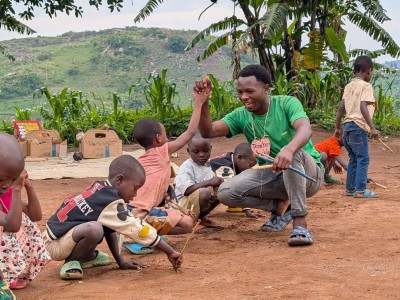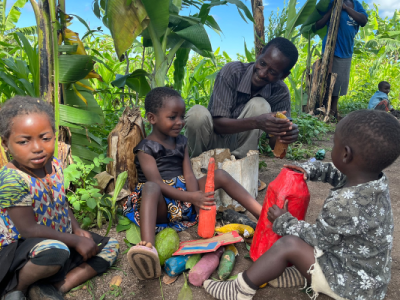“Children teach us the games from school and they ask us to play or dance with them, they demand us to sing along and dance with them. I feel good when my child is singing and dancing at home, I also learn something and feel stress free.”
- Parent
Further evidence from focus group discussions, tells us that the programme has improved children’s relationships with their fathers in particular. Fathers are taking an active role in their children’s education - in one area there are now more fathers attending engagement sessions than mothers. A huge achievement for an early years programme in a refugee context.
Cluster group caregivers are refugees and members of the local community in which they teach.
They are taught in an in-service manner, learning from more experienced caregivers, over the course of 6-9 months and are offered planning support and ongoing mentoring to ensure they are able to thrive. They receive a nationally recognised community child care certification as established in the national ECD training framework.
“We have learnt how to care for children, love them and have patience… We are welcomed, supported and valued. Tutors teach well, supporting us in planning and material development”
Cluster Group Teacher
One of the most unique aspects of our ECE programme in a humanitarian setting, is that it is inherently sustainable. This is for three reasons:
The use of existing structures, peoples homes and outdoor spaces, means there are no expensive construction, maintenance or rental costs.
Cluster lesson with sustainably made learning materials and refugee teacher
Building the capacity of Teacher Trainers (volunteers) Cluster Learning Management Committees identified from within the community who will continue with the programme after Children on the Edge have left.
In lieu of expensive, unsustainable salaries, caregivers are enrolled into Village Savings and Loans Association (VSLA) groups where they are trained and resourced to set up their own businesses.
Parents can access VSLA groups, improving community economies and enabling them to contribute towards small caregiver stipends and resources needed at the cluster groups (such as materials, shelters, latrines etc)
These elements reduce reliance on short term international funding and ensure that refugee communities can provide ECE for their children, long into the future.
The Cluster Learning Programme is highly regarded locally with endorsements from UNHCR and the Ministry of Education. Children on the Edge has been appointed as the lead organisation for ECE in Kyaka II and have recently been asked to join the Education in Emergencies Innovation and Pedagogy Task Force in Uganda.
This programme offers a cost-effective, replicable and sustainable solution, ensuring refugee children can benefit from ECE and setting them up for lifelong learning.
The model has now been successfully codified, together with the writing of an implementation plan and subsequent training manuals, ready to scale up and replicate the programme.
Children on the Edge aim to reach an estimated 13,500 children across the settlement.
If you are from an organisation looking to use this model, or would like to find out more, please contact Sarah Ndlovu, our Education Specialist: sarahndlovu@childrenontheedge.org or call +44 (0) 1243 538530







